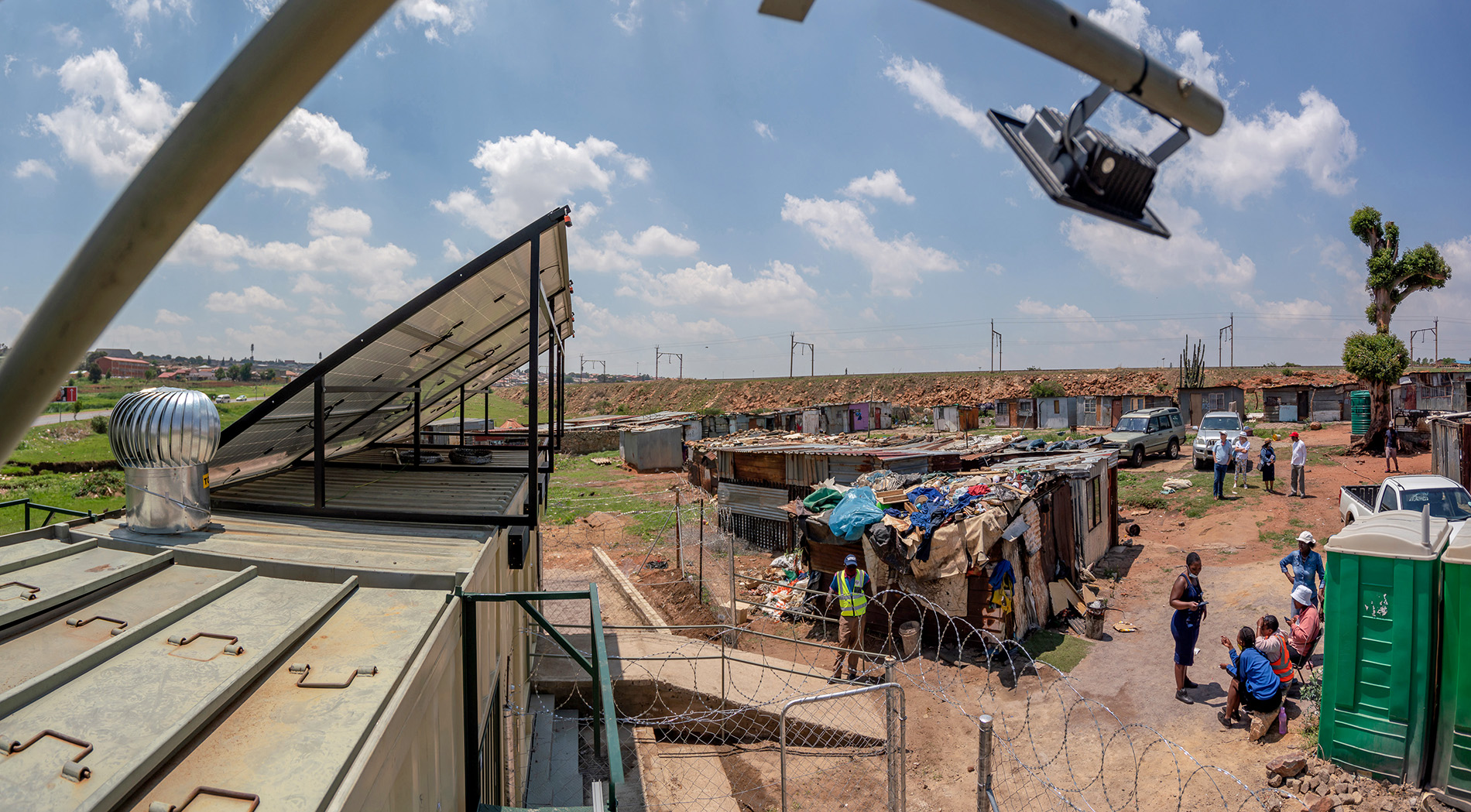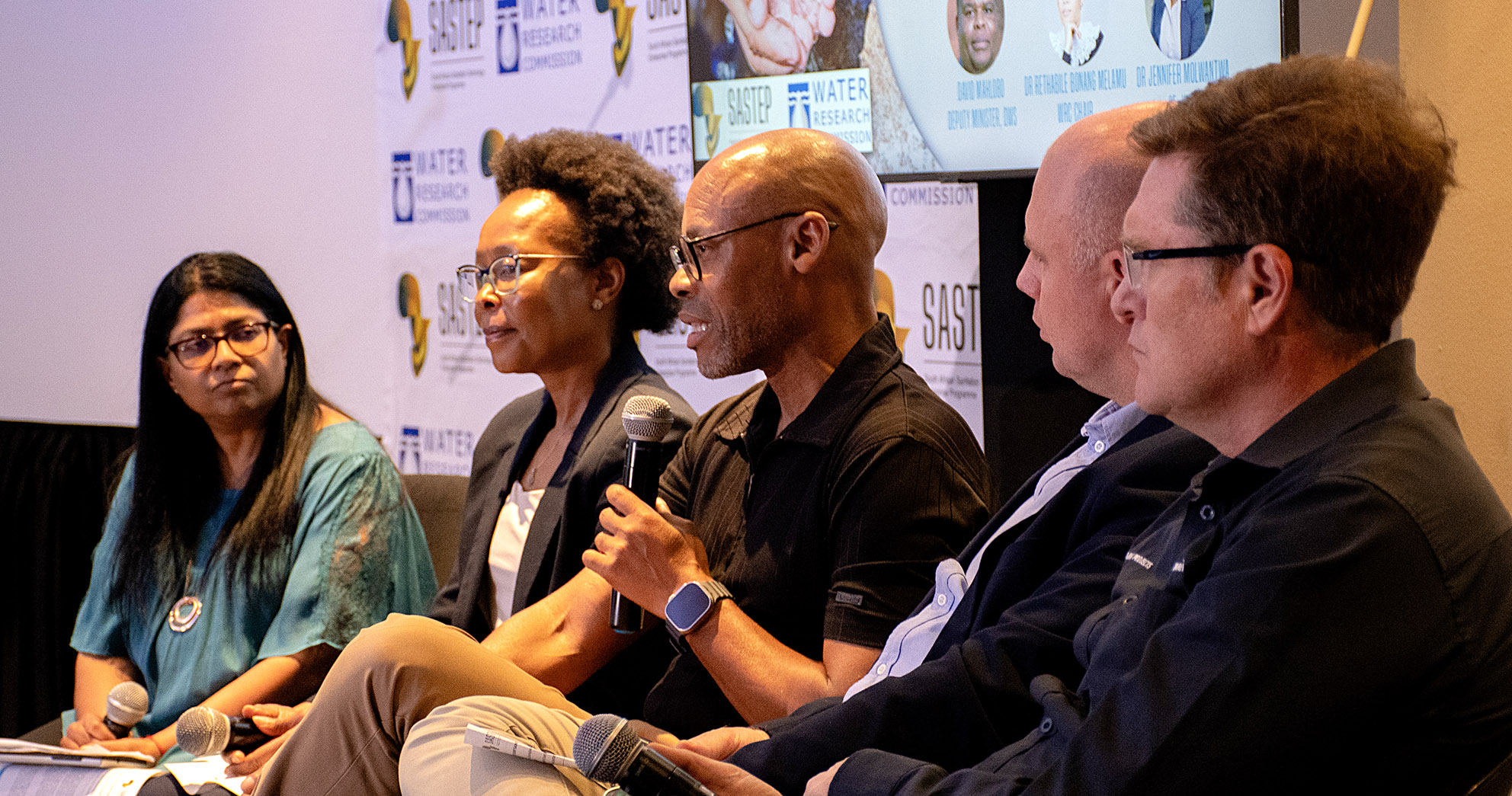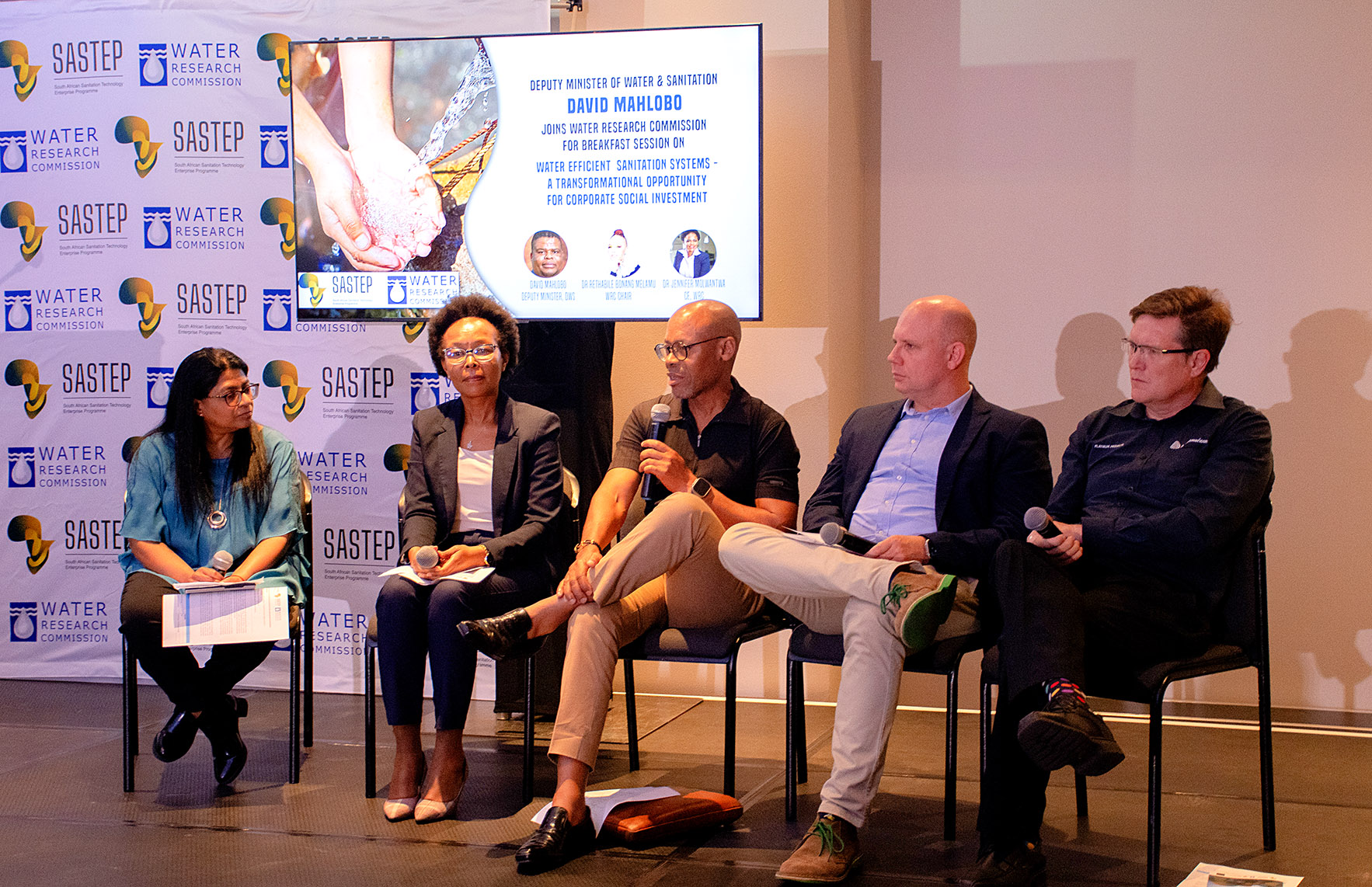Thousands of schools in South Africa still only provide pit toilets — a hole dug in the ground where waste is deposited — which are often unsafe, unsanitary, and degrading facilities.
In fact, earlier this week, Siviwe Gwarube, Minister of Basic Education in South Africa’s new government of national unity, made a promise that by 31 March 2025 all pit toilets in South African schools would be eradicated.
Read more: Here’s my promise — by 31 March 2025 all pit toilets in SA schools will be eradicated
Replacing pit toilets with traditional toilets isn’t always feasible in rural, remote areas. But decentralised approaches championed by the South African Sanitation Technology Enterprise Programme (Sastep) are better suited to these environments, as they don’t have to rely on both the sewerage and power grids.
During a water and sanitation technology investment summit hosted by the Water Research Commission on Tuesday, it was highlighted that such systems had improved school attendance in areas where they’d been implemented.
According to Unicef nearly half of the world’s population lacks access to hygienic sanitation facilities and about 700 children under the age of five die daily from diarrhoea linked to unsafe water, sanitation and poor hygiene. This was highlighted at the investment summit on Tuesday, which also marked World Toilet Day.
In his keynote address Deputy Minister of Water and Sanitation, David Mahlobo, pointed out that more than 3-billion people globally lacked access to decent sanitation.
The summit invited water boards and corporations to demostrate how corporate social budgets can be used to support the implementation of innovative sanitation solutions, and to spotlight innovative technologies that could revolutionise sanitation delivery.
In South Africa, Mahlobo acknowledged that sanitation access remained a challenge, particularly in informal settlements where infrastructure had not kept pace with population growth.
Rethinking sanitation systems
The Water Research Commission’s South African Sanitation Technology Enterprise Programme, supported by the Department of Water and Sanitation, and funded by the Bill & Melinda Gates Foundation and Department of Science and Innovation, aims to rethink sanitation systems from the ground up.
Dr Valerie Naidoo, Executive Manager, told Daily Maverick: “Imagine toilets that don’t need sewerage pipes or excessive water. What if waste could be turned into energy or fertiliser?”
The South African Sanitation Technology Enterprise Programme’s goal, she said, was a circular economy approach. Instead of treating all water to drinking standards, sanitation systems could focus on reuse and efficiency, reducing water demand and improving sustainability.
At the summit, the Water Research Commission showcased several innovative sanitation technologies, that are not as water intensive as traditional toilets, and are decentralised from the sewerage and power grid.
- The Arumloo — a low-flush toilet that uses only two litres of water to flush. This tech has been installed in the rural Eastern Cape, and it features a splash-free vortex system, an odour-preventing water seal, and a dewdrop system that treats wastewater using solar power, rainwater, and borehole supplies for low-maintenance reliability.
- The NEWGenerator system — an off-grid sewage treatment system has an anaerobic digester that treats the sewage by breaking down microorganisms to produce biogas. Clean water is filtered out, with bacteria, viruses and any remaining solid particles removed and then disinfected through a chlorination system.
- Clear recirculation toilet system — employs an advanced biofilm MBR treatment process to recycle water. The system produces clean, safe effluent that is further disinfected through ozone treatment, ensuring high-quality water for reuse.
- Aquonic treatment system — a modular solution that recycles both black and grey water into pathogen-free, reusable water for toilet flushing and irrigation. Using biological and electrochemical processes, it can even be retrofitted to existing septic tanks to improve overflow water quality.
Groundhog Day
While decentralised toilets — those off-grid, modular systems — make sense for rural areas, their upkeep is a different story. Toilets don’t maintain themselves.
And operations and maintenance has been something South Africa has neglected consistently in the power and water and sanitation sector. In fact, a big reason Gauteng is facing a water crisis is due to neglected maintenance.
Naidoo emphasised that you can install smart sanitation solutions, but if there’s no plan for operations and maintenance, they fail, and you’re back to square one.
“You are forever in a Groundhog Day situation,” she said.
She explained that currently our fiscus, or taxpayer money, covers capital expenditure of putting up sanitation facilities.
But what’s not always being paid for by the fiscus is operations and maintenance. And in areas where people can’t afford to pay for operations and maintenance, this is an issue.
“If you put CapEx (Capital Expenditure) through the tax base, you’re going to end up leaving a system to fail. Then you’re going to come back again to put in more CapEx because the law says you have to provide service — and you keep repeating,” she said, “and that, for me, is unsustainable and wasteful.
“As opposed to saying, can we think about operations and maintenance differently? Can we find different financing models for that?”
Decentralise toilets, centralise maintenance
Nadioo is proposing decentralising sanitation (which makes sense in the rural context), but centralising operations and maintenance services.
In poor communities, asking individuals to foot the bill isn’t feasible. Instead, Naidoo is proposing a mix of government funding and corporate social investment to help with maintenance costs, and then bringing in government players, water boards and businesses who are really good at skills training, to help communities learn how to fix pumps, for example, so services are sustainable.
 A South African Sanitation Technology Enterprise Programme initiative involving Joburg Water and two commercial partners, Enviro Options and WEC Projects, was launched during the 2021 World Toilet Day at Mofolo North informal settlement in Soweto. (Photo: Water Research Commission)
A South African Sanitation Technology Enterprise Programme initiative involving Joburg Water and two commercial partners, Enviro Options and WEC Projects, was launched during the 2021 World Toilet Day at Mofolo North informal settlement in Soweto. (Photo: Water Research Commission)
 The system serves 80 households in Mofolo Informal Settlement which translate to about 400 people, assuming five people per household. (Photo: Water Research Commission)
The system serves 80 households in Mofolo Informal Settlement which translate to about 400 people, assuming five people per household. (Photo: Water Research Commission)
 The Clear Recirculating Toilet System was installed at Kagiso Tsholetsegang Primary School in Krugersdorp in November 2020. (Photo: Water Research Commission)
The Clear Recirculating Toilet System was installed at Kagiso Tsholetsegang Primary School in Krugersdorp in November 2020. (Photo: Water Research Commission)
 Ninety-nine percent of the water from this system can be recycled for reuse in the system — or toilet flushing, but not for drinking — reducing its reliance on the local water supply. (Photo: Water Research Commission)
Ninety-nine percent of the water from this system can be recycled for reuse in the system — or toilet flushing, but not for drinking — reducing its reliance on the local water supply. (Photo: Water Research Commission)
 The NEW Generator System was installed at Slovoville informal settlement in Soweto in November 2021. The system is a compact, portable and modular sewage treatment solution incorporating an anaerobic digester to treat the sewage by breaking down microorganisms to produce biogas. (Photo: Water Research Commission)
The NEW Generator System was installed at Slovoville informal settlement in Soweto in November 2021. The system is a compact, portable and modular sewage treatment solution incorporating an anaerobic digester to treat the sewage by breaking down microorganisms to produce biogas. (Photo: Water Research Commission)
 The Clear Recirculating Toilet System was installed at Kagiso Tsholetsegang Primary School in Krugersdorp in November 2020. (Photo: Water Research Commission)
The Clear Recirculating Toilet System was installed at Kagiso Tsholetsegang Primary School in Krugersdorp in November 2020. (Photo: Water Research Commission)
 The Clear Recirculating Toilet System uses a advanced 'Biofilm-MBR' treatment process as the core technology for treatment, producing a stable and clean effluent that is further disinfected. (Photo: Water Research Commission)
The Clear Recirculating Toilet System uses a advanced 'Biofilm-MBR' treatment process as the core technology for treatment, producing a stable and clean effluent that is further disinfected. (Photo: Water Research Commission)
Despite companies in South Africa spending more than R10-billion annually on corporate social investment, just R52-million of that goes to water and sanitation projects
“We’re saying, in some of those spaces, if you can find the right business case — and there’s always a business case — you actually put a whole lot of this tech out there, then centralise the services, and bring down those operations and maintenance costs.”
Naidoo is saying that instead of corporate social investment just being about footing the bill for a new smart toilet, but working with the principal, the school governing body, the parents and small businesses to make sure the infrastructure is sustainable, a project that could even be incubated for five years.
“It’s to say: ‘In the long term, how do you take care of the school? This is yours. Own it,’”she said.
Trickle-down effects
The CEO of the Water Research Commission, Jennifer Molwantwa, pointed out that this sort of centralised thinking would benefit the local population not only in terms of sanitation — but also health and water.
“Can you imagine those kids being sick all the time? Somebody’s paying. It’s called the health bill,” said Naidoo. “When you contaminate your groundwater, somebody's paying. It’s called the water supply bill.”
Naidoo emphasised that we need to look at these models within the context of the macroeconomic policy for growth. For example, if unemployment gets brought down, or fewer people are having to pay for health and water costs, they can afford to pay for operations and maintenance.
“What we forget is that we are paying indirectly,” she said. “So can we pay maybe towards the operations and maintenance of sustainable systems, and then you take away some of the health costs and some of the water treatment costs.”
 David Mahlobo, Deputy Minister of Water and Sanitation, speaks at the Next Generation Water Efficient Sanitation Technologies Investment Summit in Sandton, Johannesburg, on 19 November 2024. (Photo: Water Research Commission)
David Mahlobo, Deputy Minister of Water and Sanitation, speaks at the Next Generation Water Efficient Sanitation Technologies Investment Summit in Sandton, Johannesburg, on 19 November 2024. (Photo: Water Research Commission)
 Nhlanhla Zama (centre), Senior Manager of Enterprise and Supplier Development at the uThukela Water Board, during the panel discussion. (Photo: Julia Evans)
Nhlanhla Zama (centre), Senior Manager of Enterprise and Supplier Development at the uThukela Water Board, during the panel discussion. (Photo: Julia Evans)
She said that the Water Research Commission had seen first hand with projects it was implementing in Giyani in Limpopo, that communities were prepared to contribute some money toward operations and maintenance of the infrastructure.
Minister Mahlobo had a similar idea, telling businesses at the investment summit: “You can’t coexist in a sea of poverty… When you invest in people, don’t think that we need a handout,” he said. “We don't want handouts, we want a lifting hand.”
Impact investing
Max Pichulik, co-founder of Impact Amplifier, spoke about “impact investing” at the summit, an idea that combines financial returns with social good.
“Capital can be a form of justice,” Pichulik said. Instead of relying solely on grants, he advocated for using tools like venture debt and equity investments to scale sanitation technologies. He also called on South Africa to rely less on international funding and more on local innovation.
“Unless we structurally change our economy and raise incomes, households won’t be able to afford better sanitation,” he said.
Naidoo also brought this point to home, saying: “We need to make tough choices and stop regurgitating the old way of thinking.” DM




 Nhlanhla Zama (centre), Senior Manager of Enterprise and Supplier Development at the uThukela Water Board, during panel discussion at the Next Generation Water Efficient Sanitation Technologies Investment Summit in Sandton, Johannesburg, 19 November 2024. (Photo: Julia Evans)
Nhlanhla Zama (centre), Senior Manager of Enterprise and Supplier Development at the uThukela Water Board, during panel discussion at the Next Generation Water Efficient Sanitation Technologies Investment Summit in Sandton, Johannesburg, 19 November 2024. (Photo: Julia Evans) 